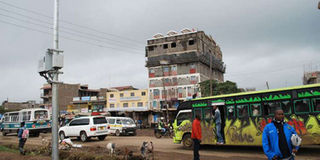Premium
Ongata Rongai is quickly losing its magic appeal

These are fast-growing areas, very attractive to property investors, but there are many challenges. There is poor infrastructure, poor lighting and social amenities in relation to their populations. Many tenants are leaving the area, and a number of rental buildings are half occupied. PHOTO | PAUL LETIWA
What you need to know:
- According to Mr Robert Macharia, the chairman of the Greater Rongai Residents Welfare Association (Gorrwa), doing business in the two centres is becoming expensive.
- The area also has an acute shortage of public schools, and piped water.
Benjamin Ruto moved from Roysambu along Thika Road to Ongata Rongai in 2012. “I lived along Thika Road for three years. It was a good place but I was forced to move our because the landlord kept increasing the rent. I decided to move to Ongata Rongai where, I had been told, rents were 50 per cent cheaper,’ he says.
However, life in Ongata Rongai turned out to be even more expensive.
“Commuting to the city every day is costly, whether by public means or a personal car, and the traffic is terrible. But I think those living in Kiserian are even worse of,” says Mr Ruto, who is contemplating moving out of the area.
Mr Cyrus Kamau is equally unhappy. In 2009, he bought a piece of land along Magadi Road on the way to Kiserian, in the fast developing residential areas.
After about one-and-half years, he finished putting up a residential building in the Acacia area, about 10km from Kiserian Town. But like many other investors in Ongata Rongai and Kiserian, Mr Kamau realised that he had made a mistake and is contemplating selling his house.
“These are fast-growing areas, very attractive to property investors, but there are many challenges. There is poor infrastructure, poor lighting and social amenities in relation to their populations. Many tenants are leaving the area, and a number of rental buildings are half occupied,” he says.
INDUSTRIAL TOWN
Julius Were, a housing agent at Kandisi in Ongata Rongai concurs. “I have worked here for several years and tenants come and go.”
A visit to the two areas shows one narrow standard road (Magadi Road), which serves the more than 300,000 residents of Ongata Rongai and Kiserian. The other roads in the busy trading centres pass through garbage.
According to Mr Robert Macharia, the chairman of the Greater Rongai Residents Welfare Association (Gorrwa), doing business in the two centres is becoming expensive.
“The poor road network is raising the cost of doing business here. Who would want to put his/her money where tenants and small traders are constantly moving out?” he asks.
The rapid urbanisation of the two areas is generally fuelled by land speculation. This has shifted attention from highly productive economic activities and led to the emergence of informal and often illegal activities like intensive use of agro-chemicals and fertilizers for horticultural production, and mining or quarrying to supply building materials.
The area also has an acute shortage of public schools, and piped water.
“The only way to save Rongai is to improve its road network,” the town’s Member of County Assembly, Mr Mwathi Pere, says. He attributes the town’s chaotic development to several factors.
“The defunct local authority, Olkejuado County Council, is to blame. It basically did nothing towards the development of Rongai. The central government, too, is to blame for neglecting Rongai and Kiserian. But all is not lost; devolution is helping to improve the image and planning of the two areas,” he says the MCA.
Commenting on Ongata Rongai, which serves as a dormitory town for Nairobi, a report titled “The Planning Challenge of Ongata Rongai, Karen and Kiserian Peripheral Location” says: “Strip and nodal physical development obtaining in the area has not occurred under planning control, with haphazard developments first coming along Magadi Road and then spreading to the interior.
“Present too is unchecked animal keeping and settlements encroaching on/polluting Mbagathi River,”
Despite its ever-growing population, the area’s status remains unclear, as it has not been granted even township status.





